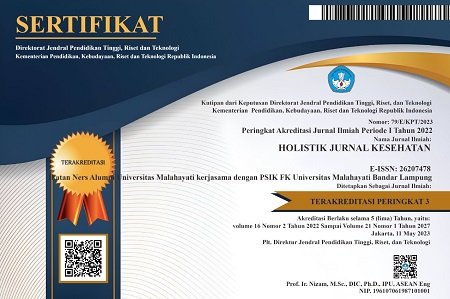Fatigue dan status nutrisi pada pasien dengan kanker payudara yang menjalani kemoterapi
Abstract
Fatigue and nutritional status in patients with breast cancer undergoing chemotherapy
Background: Breast cancer is one type of cancer and is one of the leading causes of death in the world. Cancer patients who receive chemotherapy are at risk of impaired nutritional status due to the disease and its treatment. Chemotherapy treatment can have side effects on the gastrointestinal system such as nausea, vomiting, stomatitis, anorexia, changes in taste. These side effects can cause the patient's nutritional intake to decrease. Cancer and its treatment can cause fatigue complaints.
Purpose: to identify the relationship between fatigue and nutritional status in patients with breast cancer patients undergoing chemotherapy
Methods: The design of this study was quantitative using a cross sectional approach. The population in this study were patients with breast cancer undergoing chemotherapy. This research was conducted at Dr.H. Abdul Moeloek Hospital of Lampung Province with 42 respondents.
Results: Spearman correlation test results found that nutritional status variables have a significant relationship with fatigue (p value = 0.031) with moderate correlation strength (r = 0.471).
Conclusion: The nursing intervention on the side effects of chemotherapy treatment which has a positive effect on nutritional conditions in an effort to overcome nutritional disorders and complaints of fatigue in cancer patients.
Keywords: Breast Cancer; Chemotherapy; Fatigue; Nutritional Status
Pendahuluan: Kanker payudara merupakan salah satu jenis kanker dan menjadi salah satu penyebab kematian di dunia. Pasien kanker yang menerima kemoterapi memiliki resiko gangguan status nutrisi akibat penyakit dan pengobatannya. Pengobatan kemoterapi dapat memberikan efek samping terhadap sistem ganstrointestinal seperti mual, muntah, stomatitis, anoreksia, perubahan rasa. Efek samping tersebut dapat menyebabkan asupan nutrisi pasien dapat mengalami penurunan. Kanker dan pengobatannya dapat menyebabkan keluhan fatigue.
Tujuan: Mengetahui adanya hubungan antara status nutrisi terhadap fatigue pada pasien kanker payudara yang menjalani kemoterapi.
Metode: Desain penelitian ini adalah kuantitatif dengan menggunakan pendekatan cross sectional . Populasi pada penelitian ini adalah pasien dengan kanker payudara yang menjalani kemoterapi. Penelitian ini dilakukan di RSUD Dr.H. Abdul Moeloek Provinsi Lampung dengan 42 responden.
Hasil: Pada uji korelasi spearman didapatkan bahwa variabel status nutrisi mempunyai hubungan yang bermakna dengan fatigue ( p value = 0,031) dengan kekuatan korelasi sedang (r = 0,471).
Simpulan: Kesimpulan diperlukan intervensi keperawatan terhadap efek samping pengobatan kemoterapi yang berdapak terhadap kondisi nutrisi dalam upaya mengatasigangguan nutrisi dan keluhan fatigue pada pasien kanker
Keywords
Full Text:
PDFReferences
American Cancer Society. (2016). Breast Cancer Facts & Figures 2015-2016. Atlanta: American Cancer Society.
American Joint Committee on Cancer. (2010). What is cancer staging. URL: http://www.cancerstaging.org/mission/whatis.html.
Black, J. M., & Hawks, J. H. (2014). Keperawatan medikal bedah: manajemen klinis untuk hasil yang diharapkan. Elsevier (Singapore).
Campos, M. P. D. O., Hassan, B. J., Riechelmann, R., & Giglio, A. (2011). Cancer-related fatigue: a review. Revista da Associacao Medica Brasileira, 57(2), 211-219.
Ferguson, M., Capra, S., Bauer, J., & Banks, M. (1999). Development of a valid and reliable malnutrition screening tool for adult acute hospital patients. Nutrition, 15(6), 458-464
International Agency for Research on Cancer. (2012). Estimated cancer incidence, mortality, and prevalence worldwide in 2012.
Kementerian Kesehatan Republik Indonesia. (2013). Riset kesehatan dasar. Jakarta: Badan Penelitian dan Pengembangan Kesehatan.
Manir, K. S., Bhadra, K., Kumar, G., Manna, A., Patra, N. B., & Sarkar, S. K. (2012). Fatigue in breast cancer patients on adjuvant treatment: course and prevalence. Indian journal of palliative care, 18(2), 109.
Mariani, L., Vullo, S. L., & Bozzetti, F. (2012). Weight loss in cancer patients: a plea for a better awareness of the issue. Supportive Care in Cancer, 20(2), 301-309.
Mendoza, T. R., Wang, X. S., Cleeland, C. S., Morrissey, M., Johnson, B. A., Wendt, J. K., & Huber, S. L. (1999). The rapid assessment of fatigue severity in cancer patients: use of the Brief Fatigue Inventory. Cancer, 85(5), 1186-1196.
Miaskowski, C., & Aouizerat, B. E. (2014). Contribution of sleep disturbance to cancer fatigue. In Impact of Sleep and Sleep Disturbances on Obesity and Cancer (pp. 169-192). Springer, New York, NY
National Comprehensive Cancer Network. (2012). Clinical practice guidelines in oncology. NCCN Chronic Myeloge-nous Leukemia Guidelines.
National Comprehensive Cancer Network. (2014). Clinical practice guidelines in oncology (NCCN Guidenlines): cancer-related fatigue. NCCN.org.
Paramita, N. (2015). Uji kesahihan dan keandalan brief fatigue inventory (BFI) versi Bahasa Indonesia pada pasien kanker = Validity and reliability of brief fatigue inventory (BFI)- Indonesian Version in cancer patients. Tesis. Program Studi Kedokteran Fisik dan Rehabilitas. Universitas Indonesia
Polovich, M., Whitford, J., & Olsen, M. (2008). Chemotherapy and biotherapy guidelines and recommendations for practice. Oncology Nursing Society
Potter, P.A., & Perry, A.G. (2006). Buku ajar fundamental keperawatan . Jakarta: EGC
Reiner, A., & Lacasse, C. (2006). Symptom correlates in the gero-oncology population. In Seminars in oncology nursing (Vol. 22, No. 1, pp. 20-30). WB Saunders
Rosdahl, C. B., & Kowalski, M. T. (2012). Buku ajar keperawatan dasar. Jakarta: EGC.
Ryan, J. L., Carroll, J. K., Mustian, K. M., Fiscella, K., & Morrow, G. R. (2007). Mechanisms of cancer-related fatigue. The oncologist, 12(Supplement 1), 22-34.
Sánchez, L. K., Ugalde, M. E., Motola, K. D., & Green, D. (2013). Gastrointestinal symptoms and weight loss in cancer patients receiving chemotherapy. British Journal of Nutrition, 109(5), 894-897.
Sherwood, L. (2014). Fisiologi manusia: dari sel ke sistem; Ed.8. Jakarta: EGC
Wang, X. S. (2008). Pathophysiology of cancer-related fatigue. Clinical journal of oncology nursing, 12(5 Suppl), 11.
Wei, J. N., & Li, S. X. (2018). The relationship between nutritional risks and cancer-related fatigue in patients with colorectal cancer fast-track surgery. Cancer nursing, 41(6), E41-E47
DOI: https://doi.org/10.33024/hjk.v13i4.1885
Refbacks
- There are currently no refbacks.
Copyright (c) 2019 HOLISTIK JURNAL KESEHATAN

This work is licensed under a Creative Commons Attribution-NonCommercial 4.0 International License.














